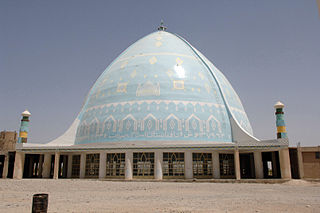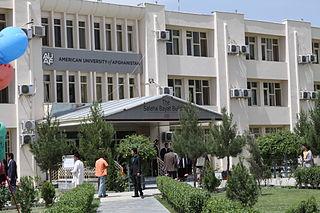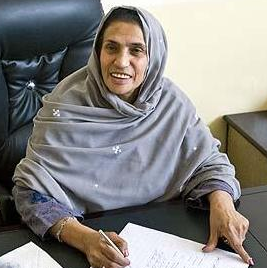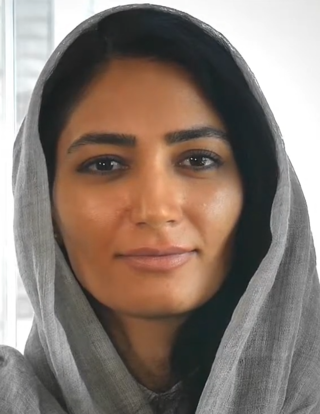Related Research Articles

Afghanistan, officially the Islamic Emirate of Afghanistan, is a landlocked country located at the crossroads of Central Asia and South Asia. It is bordered by Pakistan to the east and south, Iran to the west, Turkmenistan to the northwest, Uzbekistan to the north, Tajikistan to the northeast, and China to the northeast and east. Occupying 652,864 square kilometers (252,072 sq mi) of land, the country is predominantly mountainous with plains in the north and the southwest, which are separated by the Hindu Kush mountain range. Kabul is the country's capital and largest city. According to the World Population review, as of 2023, Afghanistan's population is 43 million. The National Statistics Information Authority of Afghanistan estimated the population to be 32.9 million as of 2020.

Kandahar is a city in Afghanistan, located in the south of the country on Arghandab River, at an elevation of 1,010 m (3,310 ft). It is Afghanistan's second largest city, after Kabul, with a population of about 614,118. It is the capital of Kandahar Province and the centre of the larger cultural region called Loy Kandahar.

The treatment of women by the Taliban refers to actions and policies by two distinct Taliban regimes in Afghanistan which are either specific or highly commented upon, mostly due to discrimination, since they first took control in 1996. During their first rule of Afghanistan, the Taliban were notorious internationally for their misogyny and violence against women. In 1996, women were mandated to wear the burqa at all times in public. In a systematic segregation sometimes referred to as gender apartheid, women were not allowed to work, nor were they allowed to be educated after the age of eight. Women seeking an education were forced to attend underground schools, where they and their teachers risked execution if caught. They were not allowed to be treated by male doctors unless accompanied by a male chaperone, which led to illnesses remaining untreated. They faced public flogging and execution for violations of the Taliban's laws.

Kandahār is one of the thirty four provinces of Afghanistan, located in the southern part of the country, sharing a border with Pakistan, to the south. It is surrounded by Helmand in the west, Uruzgan in the north and Zabul Province in the east. Its capital is the city of Kandahar, which is Afghanistan's second largest city, which is located on the Arghandab River. The greater region surrounding the province is called Loy Kandahar. The Emir of Afghanistan sends orders to Kabul from Kandahar making it the de facto capital of Afghanistan, although the main government body operates in Kabul. All meetings with the Emir take place in Kandahar, meetings excluding the Emir are in Kabul.

Education in Afghanistan includes K–12 and higher education, which is under the Ministry of Education and Ministry of Higher Education. In 2021, there were nearly 10 million students and 220,000 teachers in Afghanistan. The nation still requires more schools and teachers. Soon after the Taliban take took the country in August 2021, they banned girls from secondary education. Some provinces still allow secondary education for girls despite the ban. In December 2022, the Taliban government also prohibited university education for females in Afghanistan, sparking protests and international condemnation. In December 2023, investigations were being held by the United Nations into the claim that Afghan girls of all ages were allowed to study at religious schools. As of November 2024, some parts of the country allow women to attend religious schools to pursue dentistry, nursing, and other subjects.
Human rights in Afghanistan under the Taliban regime are severely restricted and considered among the worst in the world. Women's rights and freedom are severely restricted, as they are banned from most public spaces and employment. Afghanistan is the only country in the world to ban education for women over the age of eleven. Taliban's policies towards women are usually termed as gender apartheid. Minority groups such as Hazaras face persecution and eviction from their lands. Authorities have used physical violence, raids, arbitrary arrests and detention, torture, enforced disappearances of activists and political opponents.
Safia Amajan, also spelt Ama-jan, Ama Jan, Ahmed-jan and Ahmed Jan, was an Afghan women's rights activist, educator, politician, and critic of the Taliban's suppression of women, who was shot and killed in 2006, reportedly by the Taliban.

Women's rights in Afghanistan are severely restricted by the Taliban. In 2023, the United Nations termed Afghanistan as the world's most repressive country for women. Since the US troops withdrawal from Afghanistan in 2021, the Taliban gradually imposed restrictions on women's freedom of movement, education, and employment. Women are banned from studying in secondary schools and universities, making Afghanistan the only country to prohibit females from studying beyond the sixth grade. Women are not allowed in parks, gyms, or beauty salons. They are forbidden from going outside for a walk or exercise, from speaking or showing any part of their face or body outside the home, or even from singing or reading from within their own homes if they could be heard by strangers outside. In extreme cases, women have reportedly been subjected to gang-rape and torture in Taliban prisons.

Sitara Achakzai was a leading Afghan women's rights activist and a member of the regional parliament in Kandahar. She was assassinated by the Taliban.
Nāzo Tokhī, commonly known as Nāzo Anā, was an Afghan poet and writer in the Pashto language. Mother of the famous early-18th century Afghan king Mirwais Hotak, she grew up in an influential family in the Kandahar region. She is remembered as a brave woman warrior in Afghan history and as the "Mother of the Afghan Nation".

Razia Jan, born in Afghanistan is the founder of Razia's Ray of Hope Foundation, a nonprofit education organization in Afghanistan.

Maryam Durani is an Afghan activist and women's advocate. In 2012 she received the International Women of Courage Award.

Fereshteh Forough is an Afghan social activist and the CEO and founder of Code to Inspire (CTI), the first coding school for girls in Afghanistan. She is an advocate for gender equality and the empowerment of women in developing countries through digital literacy, education, and financial independence.
Marianne O'Grady is an American teacher and Afghanistan's deputy country director for Care International who said that the Taliban "cannot un-educate millions of people" in the fall of Kabul (2021) and anticipated that women would continue to teach other women and girls, even if forced back "behind the wall".
Rangina Hamidi is an Afghan-American writer, educator, social activist, and politician. She is well known as an advocate for women's rights in Afghanistan and has engaged in various social projects to empower girls and women in Afghanistan. Hamidi has served as an education minister of Afghanistan, until the Taliban takeover of Afghanistan with the fall of Kabul in 2021. She was the first female education minister of Afghanistan. During the Afghanistan being taken over by the Taliban, she vowed to stay in Afghanistan and continue her humanitarian efforts by actively involving in empowerment of Afghan women. However, after several weeks, she fled with her family to Arizona.
The politics of Afghanistan are based on a totalitarian emirate within the Islamic theocracy in which the Taliban Movement holds a monopoly on power. Dissent is not permitted, and politics are mostly limited to internal Taliban policy debates and power struggles. As the government is provisional, there is no constitution or other basis for the rule of law. The structure is autocratic, with all power concentrated in the hands of the supreme leader and his clerical advisors. According to the V-Dem Democracy indices Afghanistan was as of 2023 the 4th least electoral democratic country in the world.
Matiullah Wesa is an Afghan girl's education advocate and the founder of The Pen Path organisation.
Razia Barakzai is an Afghan women's rights activist. She was named one of the BBC's 100 Women in 2021 for leading the first women's protests against the Taliban in August 2021, following their takeover of Afghanistan earlier that month.
Summia Tora is an Afghan campaigner for women's and refugee rights and a social entrepreneur. In November 2023, she was included on the BBC's 100 Women list.
Nayera Kohistani is an Afghan women's rights activist. She lived through the first Taliban rule in her country. She was a protestor when they came to power again. She left the country in 2022 after being imprisoned and she is a prominent protestor against the "gender apartheid" and criminalisation of gender in Afghanistan.
References
- 1 2 3 Idaszak, Josh (Spring 2022). "In Exile, but Undaunted". Wellesley Magazine. Retrieved 2023-09-20.
- 1 2 3 4 5 "Pashtana's Diary". LEARN. Retrieved 2023-09-20.
- ↑ "My Organization Empowers Girls Through Education — By Running Underground Schools in Afghanistan". Global Citizen. 2023-02-07. Retrieved 2023-09-20.
- 1 2 3 4 5 6 Kumar, Ruchi (2023-03-09). "The Afghan woman running covert schools under the Taliban's nose". The National. Retrieved 2023-09-20.
- 1 2 3 4 "This Afghan Activist Is Fighting for Girls' Education Despite Living in Exile". Global Citizen. 2023-06-07. Retrieved 2023-09-20.
- ↑ Sappenfield, Mark (2024-02-15). "She fled the Taliban, but leads efforts to help educate Afghan girls". Christian Science Monitor. ISSN 0882-7729 . Retrieved 2024-12-06.
- ↑ Nawaz, Amna; Kotuby, Stephanie; Gold, Alexa (2024-02-26). "Afghan activist's memoir details her inspirational fight to educate women". CANVAS Arts. Retrieved 2024-12-06.
- ↑ Abé, Nicola (2022-03-28). "Afghanistan und Bildung: »Es ist unwürdig, dass diese Mädchen weinen müssen, damit die Welt hinsieht«". Der Spiegel (in German). ISSN 2195-1349 . Retrieved 2023-09-20.
- ↑ "2022 Summit". Young Activists Summit. 2022-09-12. Retrieved 2023-09-20.
- ↑ "LAST TO EAT, LAST TO LEARN". Kirkus Reviews. March 3, 2023. Retrieved September 20, 2023.
- ↑ "Activists secretly educating Afghan children amid Taliban crackdown". PBS News. 2024-08-30. Retrieved 2024-12-06.
- ↑ Mahfouz, Sola (2024-03-27). "Pashtana Durrani: An Afghan Educator Running an Underground School for Girls". Wilson Center. Retrieved 2024-12-06.
- ↑ Kumar, Ruchi (2024-12-04). "Rights Group: Afghan women barred from studying nursing and midwifery". NPR .